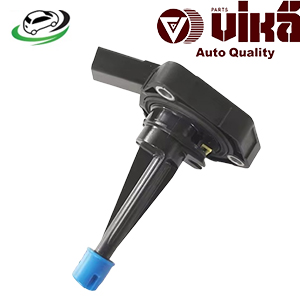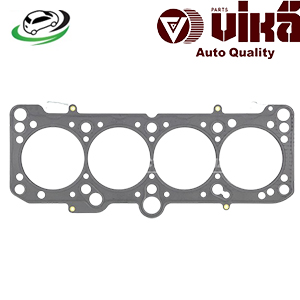-12%
Get AUDI 80 B4 Avant (8C5)/ AUDI 80 B4 Saloon / VW Golf III (1H1)/ Caddy II MPV/ Passat B3/B4/ Vento (1H2) Cylinder Head Gasket 050103383A
The cylinder head gasket is a flat, precision-engineered seal that fits between the engine block and the cylinder head. It serves as a barrier to prevent fluids like coolant and oil from leaking into the cylinders or combustion gases from escaping into other parts of the engine. The cylinder head gasket is essential for maintaining the integrity of the engine’s combustion process and preventing critical system failures.
Location
- The cylinder head gasket is located between the engine block (where the pistons move up and down) and the cylinder head (which contains the valves, spark plugs, and other important components).
2. Function of a Cylinder Head Gasket
The cylinder head gasket has several key functions that make it indispensable to the engine’s operation:
1. Sealing the Combustion Chambers
- The primary function of the head gasket is to seal the combustion chambers, ensuring that the high-pressure mixture of air and fuel burns efficiently. This containment is critical for maintaining engine compression, which in turn influences power output, fuel efficiency, and overall performance.
2. Preventing Cross-Contamination
- The gasket prevents the mixing of engine fluids: coolant, oil, and combustion gases. Cross-contamination can lead to engine failure. For example, if oil and coolant mix, it can cause overheating, poor lubrication, and damage to engine components.
3. Maintaining Oil and Coolant Pathways
- The head gasket ensures that oil flows to the right places (such as the crankshaft and camshaft) for proper lubrication while also allowing coolant to circulate around the engine to manage heat. The gasket must maintain these separate channels to prevent engine overheating and wear.
4. Containing Combustion Pressure
- Inside the combustion chamber, the air-fuel mixture ignites, creating immense pressure. The cylinder head gasket must withstand this pressure to maintain engine efficiency and prevent loss of power.
3. Types of Cylinder Head Gaskets
There are several types of head gaskets, each designed to meet the specific needs of different engines:
1. Multi-Layer Steel (MLS) Gaskets
- Description: These gaskets consist of multiple layers of steel, with rubber coatings in between. MLS gaskets are known for their durability and ability to withstand high temperatures and pressure.
- Applications: Commonly used in modern engines, especially in high-performance or turbocharged engines.
2. Copper Gaskets
- Description: Copper head gaskets offer excellent thermal conductivity and a strong seal, particularly in high-performance engines. They are typically custom-made and often require machining of the cylinder head and block.
- Applications: Frequently used in race cars and high-performance engines where extreme temperatures and pressures are present.
3. Composite Gaskets
- Description: Made from materials like graphite or asbestos (in older engines), composite gaskets are thick and flexible, making them easier to install. However, they are less durable than MLS gaskets.
- Applications: Used in older vehicles or engines with lower compression.
4. Elastomeric Gaskets
- Description: These gaskets incorporate elastomeric seals around the coolant and oil passages, enhancing their ability to prevent leaks.
- Applications: Found in some specialized engines, particularly where improved sealing around fluid passages is required.
4. Benefits of a High-Quality Cylinder Head Gasket
Using a high-quality head gasket has several benefits:
1. Enhanced Engine Performance
- A properly functioning head gasket ensures that the engine maintains optimal compression, which leads to better fuel efficiency and power output.
2. Prevention of Engine Overheating
- The head gasket prevents coolant and oil from mixing, which is essential for maintaining the proper operating temperature of the engine. A failed gasket can lead to overheating, which can cause severe engine damage.
3. Durability and Longevity
- A high-quality gasket can withstand the extreme temperatures and pressures inside the engine, contributing to the longevity of both the gasket and the engine itself.
4. Cost-Effectiveness
- While premium gaskets may cost more initially, they are less likely to fail prematurely, helping drivers avoid expensive repairs or even complete engine rebuilds.
5. Common Problems with Cylinder Head Gaskets
Over time, the cylinder head gasket can develop issues, leading to serious engine problems. Some common issues include:
1. Blown Head Gasket
- A “blown” head gasket occurs when the gasket fails to seal properly, allowing coolant, oil, and combustion gases to mix. This can cause a variety of symptoms, such as overheating, white exhaust smoke, loss of power, and coolant contamination.
2. Warped Cylinder Head
- Prolonged engine overheating can warp the cylinder head, causing the head gasket to fail. Warping occurs when the metal in the cylinder head expands beyond its normal range, creating gaps that the gasket cannot seal.
3. Oil or Coolant Leaks
- Leaking oil or coolant from the head gasket can lead to contamination of the engine’s systems. Oil leaking into the coolant system can form sludge, reducing the effectiveness of cooling and lubrication.
4. Compression Loss
- A failed gasket may not hold the necessary compression in the combustion chamber, leading to power loss and reduced engine performance. This may also manifest as rough idling or misfiring.
6. Symptoms of a Failing Cylinder Head Gasket
There are several telltale signs of a failing head gasket:
1. Overheating Engine
- Overheating is one of the most common symptoms of a failed head gasket. This happens because the gasket no longer separates the coolant from the combustion chambers, leading to temperature imbalances.
2. White Exhaust Smoke
- When coolant leaks into the combustion chamber due to a failed head gasket, it is burned off as white smoke. This is one of the most visible symptoms of a blown head gasket.
3. Contaminated Oil
- A head gasket failure can cause coolant and oil to mix, leading to milky, frothy oil in the engine. This can significantly reduce lubrication, increasing wear on engine components.
4. Loss of Power
- When the gasket fails to seal the combustion chamber properly, compression can leak, leading to a noticeable loss of engine power.
7. Maintenance and Prevention Tips for Cylinder Head Gaskets
Regular maintenance is key to preventing head gasket failure:
1. Monitor Engine Temperature
- Keeping an eye on the temperature gauge can help you detect overheating issues early. Overheating is a major cause of head gasket failure, so addressing cooling system issues promptly is critical.
2. Regular Coolant and Oil Checks
- Check the coolant and oil levels regularly. Low coolant or milky oil could indicate a head gasket problem. Maintaining proper fluid levels helps reduce stress on the gasket.
3. Timely Coolant Flushes
- Flushing the cooling system as recommended by the vehicle manufacturer ensures that the coolant remains effective at managing the engine’s temperature. Old, contaminated coolant can accelerate head gasket wear.
4. Use Quality Engine Oil
- High-quality oil improves lubrication and helps maintain optimal engine temperatures, reducing the chances of overheating and gasket failure.
5. Avoid Aggressive Driving
- Aggressive driving, such as frequent hard acceleration or towing heavy loads, can increase engine heat and stress on the head gasket. Adopting smooth driving habits can help prolong gasket life.
Conclusion
The cylinder head gasket is a vital engine component, responsible for sealing the combustion chamber and maintaining the separation of essential fluids such as oil and coolant. Its failure can lead to severe engine problems, including overheating, loss of power, and fluid contamination. By understanding the functions, types, common issues, and symptoms associated with head gaskets, vehicle owners can take preventive measures to maintain engine health. Regular inspections, timely fluid changes, and attention to warning signs are essential for ensuring the longevity of the cylinder head gasket and the overall performance of the engine.
Follow us on Facebook for more parts.




Reviews
Clear filtersThere are no reviews yet.